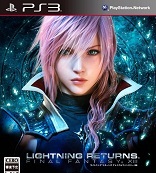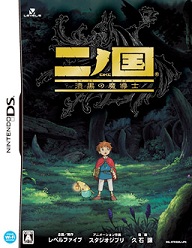Crisis Core Final Fantasy VII
Playstation Portable
Reviewed: 03/30/2008
 Selling a Final Fantasy game is easy: just stick the name on there. Pleasing the Final Fantasy fanbase, however, tends to be tricky. Grand innovation runs risk of being called “too different;” use of old tricks will surely be called overuse by some, to whom Square Enix in turn will be eloquently labeled “a bunch of whores.” Indeed, it’s impossible to please everyone with practically any endeavor, but with Final Fantasy games, it seems that any new release will be a godsend to some, pure blasphemy others.
Selling a Final Fantasy game is easy: just stick the name on there. Pleasing the Final Fantasy fanbase, however, tends to be tricky. Grand innovation runs risk of being called “too different;” use of old tricks will surely be called overuse by some, to whom Square Enix in turn will be eloquently labeled “a bunch of whores.” Indeed, it’s impossible to please everyone with practically any endeavor, but with Final Fantasy games, it seems that any new release will be a godsend to some, pure blasphemy others.
This issue is especially sensitive with Crisis Core: Final Fantasy VII because it tangles with one of the most widely cherished console RPGs of all time, and one that played a major part in breaking the genre into America’s mainstream. Too much new stuff? “This isn’t (Final Fantasy) VII at all!” Not enough new stuff? “Why the hell isn’t there a remake already!? This is the same thing I did 10 years ago!” The brave souls at Squre Enix, even staring down the urethras of millions of fans ready to piss on any product that emerges, still forged on and made this prequel.
 |
| The connection. |
To start with, Square made sure the game looked and sounded as good as possible, as Crisis Core is perhaps the best looking PSP game to date. There’s still that slight roughness around some of the edges of objects and people, but that’s a minor gripe. Takeharu Ishimoto handled the bulk of the soundtrack’s original material and remixed several of Uematsu’s pieces from the original game. The results were astounding.
Crisis Core, perhaps unexpectedly, is the source of some of the finest game music to come along in years, with both the remixes and original stuff being of very high quality. Other audio facets of voice acting and sound effects were also done well, with several sound effects being appropriately recycled from VII and voices generally working. With the above tools in place, the story could be told. Said story will probably make or break the game for most people, because those who still enjoy, or at least restrospectively appreciate Final Fantasy VII‘s story will probably be sufficiently entertained, whereas those who never cared for it have minimal reason to care about the characters and these particular events. Seeing Zack’s climb to SOLDIER First Class, encounters with Shinra’s secrets, and ties to Cloud and Sephiroth are great for VII fans, but not so much for a new crowd. Crisis Core being a prequel, this is fine.
 |
| He’s got the Awesomely Bad Villain Award all locked up for 2008 |
Nostalgia is only heightened by the interesting feelings of walking around in the FFVII environments and seeing how they look in upgraded PSP-quality visuals. As if there weren’t enough people already shouting about wanting a full Final Fantasy VII remake…seeing these old familiar places redone and revisited surely won’t put out the fire. A thorn in the side of the story is the character Genesis, who is constantly quoting nonsensical tripe from a play he’s obsessed with. It’s fine for a while, but it soon gets grating as the quotations continue to not make sense and just make him look like a tool. When trying to get back into a story a gamer first experienced 10 years ago, it’s nice not to have some new clown laming up the place. Maybe if we were still in our teens like the first time we played Final Fantasy VII, that stuff would be cool, but as it stands, we’ve aged and matured, and Genesis is as unintentionally funny as Snoop Dogg in Bones.
Pacing in this game is mostly up to the player, which is a great point for a portable RPG to claim. Save points are frequent, and at any one, Zack can embark on SOLDIER missions. The downfall of these quests is that they appear to be different, but boil down to pretty much the same thing every time: glance at the mission’s map, search the likely treasure locations, find the thing that needs to die, kill it, break its legs. Take another mission? Same thing, different spoils. There aren’t many different environments in this short game to begin with, so the variety in the missions is sparse as well. Fortunately, the missions aren’t necessary. One will surely want some of the materia, items, money, and experience they offer (especially since there is nowhere to efficiently “grind” in the traditional sense), but one can beat the game without even clearing twenty per cent of the missions. When some can be done in less than two minutes, that’s not a lot of time.
 |
| The DMW and all its random-blessing goodness |
But whether in an optional mission or the main quest, the player will be using the same battle system and interface, which is where a few problems arise amid overall quality. The DMW, a set of slot reels, starts spinning faces and numbers at the beginning of every battle. Numeric combinations determine things like level gains and temporary buffs while getting three of the same face will cause Zack to perform a “Limit.” For example, three Cloud faces make Zack do a big Meteorain-esque comet attack, while three Aerith faces give Zack “Healing Wave.” What sucks is how the player can’t just turn the thing off sometimes. At several points during the game, it gets kinda stupid being one or two hits away from killing something and then, oh wait, the slot machine takes over the screen to announce Modulation Phase, and a Limit might be coming. Cool as some of those are, there’s a time and a place for them.
It should also be noted that the level-ups are not entirely random, as the engine factors in how recent the last level gain was in its weighing of odds. The player equips Zack with materia, and the commands and spells are displayed in the bottom-right corner. Using L and R moves the cursor to an option, then htting X will use it. Getting behind and striking will land a critical, though Zack’s gotta be ready with the square button to dodge crap that fools throw his way. The combat is fun for a while, but gets pretty repetitive over time, and bosses don’t require any special strategy. Hard mode doesn’t much alter the strategies so much as drag out the battles by requiring more healing.
Crisis Core: Final Fantasy VII is a unique beast. One on hand, it’s loveable because everything feels so warmly familiar, yet clearly new. On the other, the actual gameplay is clearly imperfect and some aspects of the new/old story seem out of place or just don’t make sense. The final word would be that this game is overall enjoyable for Final Fantasy VII fans, especially those who love its story. Those who don’t care for it need not apply, as the story isn’t that good on its own, and the gameplay here is not so wonderful that it elevates Crisis Core above most other action RPGs. Therefore, it’s good, but not great.
-Heath Hindman
| Score Breakdown | ||
| Overall Good Out of 10 See our Review Criteria |
Gameplay | Average |
| Story | Good | |
| Graphics | Excellent | |
| Sound/Music | Legendary | |
| Replay Value | Below Average | |
| The Verdict: Good | ||









